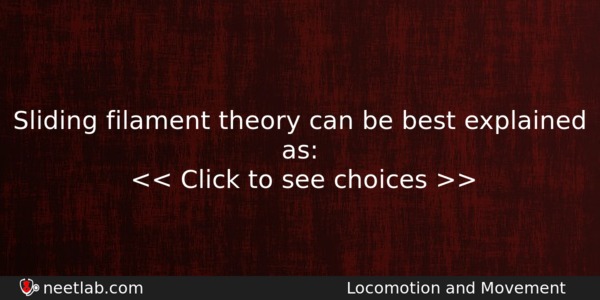| ⇦ | 
| ⇨ |
Sliding filament theory can be best explained as:
Options
(a) Actin and Myosin filaments shorten and slidepass each other
(b) Actin and Myosin filaments do not shorten but rather slide pass each other
(c) When myofilaments slide pass each other, Myosin filaments shorten while Actin filaments do not shorten
(d) When myofilaments slide pass each other Actin filaments shorten while Myosin filament do not shorten
Correct Answer:
Actin and Myosin filaments do not shorten but rather slide pass each other
Explanation:
No explanation available. Be the first to write the explanation for this question by commenting below.
Related Questions: - Which is not true about sphaerosomes
- In earthworms,neurons are
- Prokaryotic cells lack
- For transformation, micro-particles coated with DNA to be bombarded
- The total number of progeny obtained through dihybrid cross of Mendel is 1280
Topics: Locomotion and Movement
(106)
Subject: Biology
(4253)
Important MCQs Based on Medical Entrance Examinations To Improve Your NEET Score
- Which is not true about sphaerosomes
- In earthworms,neurons are
- Prokaryotic cells lack
- For transformation, micro-particles coated with DNA to be bombarded
- The total number of progeny obtained through dihybrid cross of Mendel is 1280
Topics: Locomotion and Movement (106)
Subject: Biology (4253)
Important MCQs Based on Medical Entrance Examinations To Improve Your NEET Score
18000+ students are using NEETLab to improve their score. What about you?
Solve Previous Year MCQs, Mock Tests, Topicwise Practice Tests, Identify Weak Topics, Formula Flash cards and much more is available in NEETLab Android App to improve your NEET score.
Share this page with your friends

The sliding filament theory gives the best
explanation for the mechanism of muscle
contraction. It states that contraction of a muscle
fibre takes place by the sliding of the thin filaments
over the thick filaments. This was proposed by
Hugh Huxley and Lean Hanson in 1954. According
to the theory, during a muscle contraction, thin
myofilaments show sliding towards H-zone,
shortening the sacromere, and the cross bridge of
thick myofilaments connect with portions of thin
myofilaments and move on the surface of the thin
myofilaments. This results in the sliding of thin and
thick myofilaments over each other. However, the
length of the actin filaments do not change.